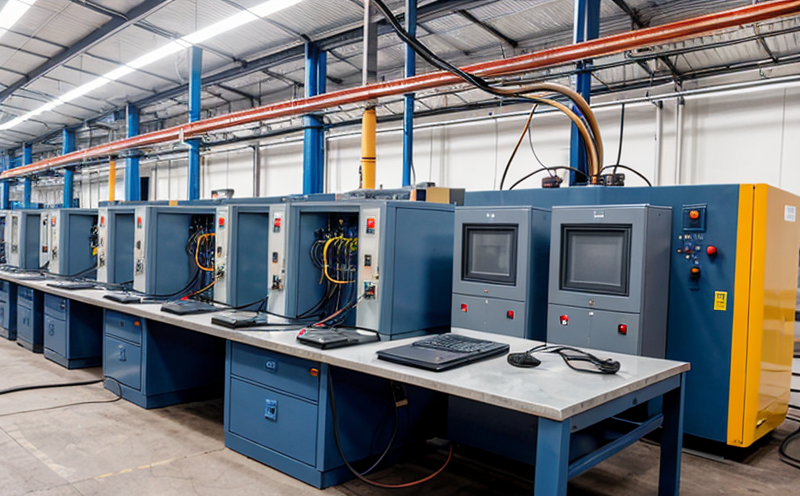IEC 62561 Lightning Protection Components Testing
The International Electrotechnical Commission (IEC) standard IEC 62561 provides a comprehensive framework for the testing and assessment of lightning protection components used in industrial electrical systems. This standard ensures that these components meet stringent requirements to protect critical infrastructure from lightning-induced damage, ensuring operational reliability and safety.
Lightning strikes can cause substantial damage to industrial facilities, leading to costly downtime, equipment failure, and potential loss of life. IEC 62561 addresses this risk by specifying a series of tests designed to evaluate the performance characteristics of lightning protection components under various conditions. These tests include impulse current testing, voltage withstand testing, and other relevant evaluations that assess the component's ability to safely redirect lightning currents away from sensitive equipment.
The scope of IEC 62561 covers a wide range of materials used in lightning protection systems such as arresters, surge protectors, and grounding devices. The standard is particularly applicable to industrial manufacturing facilities where continuous operation is crucial, and the risk of lightning-induced failures is high. By adhering to this standard, manufacturers can ensure that their components meet global quality benchmarks and are suitable for use in diverse environments.
At Eurolab, we employ state-of-the-art equipment and experienced technicians to conduct these tests according to IEC 62561 guidelines. Our laboratory is equipped with specialized test benches capable of simulating real-world lightning conditions, allowing us to provide accurate and reliable testing results. This ensures that the components tested are not only compliant with international standards but also perform optimally under expected operational scenarios.
The testing process involves a series of rigorous steps, starting with careful preparation of the specimen to be tested. This includes cleaning, inspecting for any defects, and ensuring the component is in optimal condition before testing begins. Once prepared, the specimen undergoes a battery of tests designed to simulate various lightning events, including high-voltage impulse currents and transient overvoltages.
The results from these tests are meticulously recorded and analyzed using advanced software tools. Our team then compiles detailed reports that provide insights into the performance characteristics of each component tested. These reports serve as valuable resources for quality managers, compliance officers, R&D engineers, and procurement specialists who rely on accurate data to make informed decisions.
- Impulse current testing: Evaluates the component's ability to withstand high-intensity currents without failure.
- Voltage withstand testing: Determines the maximum voltage a component can endure before breakdown occurs.
- Short-circuit current testing: Assesses how effectively the component can handle short-circuit conditions caused by lightning strikes.
Our commitment to precision and accuracy ensures that clients receive reliable test results, which are essential for maintaining compliance with regulatory requirements and enhancing overall safety in industrial settings. By partnering with Eurolab for IEC 62561 testing, organizations can confidently ensure their lightning protection components meet the highest standards of performance and reliability.
Applied Standards
IEC 62561 is one of several international standards that govern the design, testing, and certification of lightning protection systems. These include:
- IEC 62305-2 Lightning Protection Systems - Part 2: Design: Provides guidelines for designing effective lightning protection systems.
- IEEE C62.41: Offers a series of test procedures to assess surge protection devices.
- ASTM G57: Specifies the method for testing resistance to atmospheric electrical discharge.
The combination of these standards ensures that lightning protection components are not only tested but also designed and installed in a manner that adheres to best practices. By incorporating IEC 62561 into our testing protocols, Eurolab maintains strict adherence to international benchmarks, ensuring the highest level of quality and reliability.
Eurolab Advantages
At Eurolab, we pride ourselves on offering unparalleled expertise in IEC 62561 testing. Our advantages include:
- State-of-the-art equipment: Equipped with the latest technology to simulate real-world lightning conditions.
- Experienced technicians: Our team of highly skilled professionals ensures accurate and reliable test results.
- Comprehensive report generation: Detailed reports that provide actionable insights into component performance.
- Global recognition: Compliance with international standards, ensuring compatibility across diverse markets.
We understand the importance of maintaining operational integrity and safety in industrial settings. By leveraging our expertise and resources, Eurolab helps clients achieve compliance while enhancing their overall performance and reliability.
Why Choose This Test
- Ensures Compliance with International Standards: Adherence to IEC 62561 ensures that lightning protection components meet global quality benchmarks, facilitating easier market entry.
- Enhances Operational Reliability: By testing components under realistic conditions, we ensure they perform reliably in actual operational scenarios.
- Risk Mitigation: Reduces the risk of downtime and equipment failure associated with lightning strikes.
- Supports Quality Management Initiatives: Provides valuable data for continuous improvement and quality assurance programs.
- Facilitates Regulatory Compliance: Ensures that all components are in line with local and international regulations, simplifying compliance processes.
- Improves Safety Standards: By identifying potential weaknesses early on, we contribute to a safer working environment for personnel and equipment.





